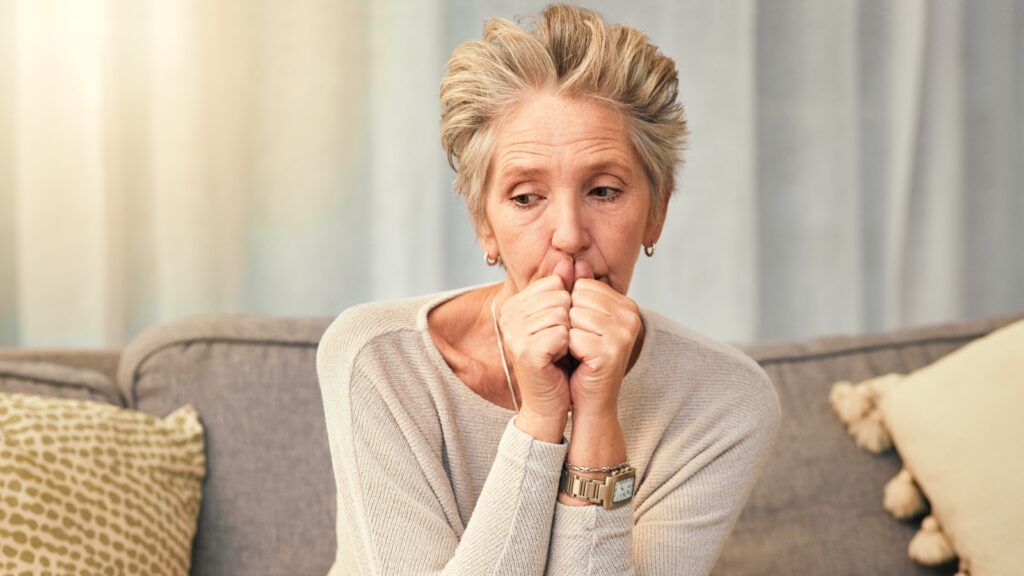Menopause is a natural part of aging, but it can come with some very unpleasant side effects. Compromised mental health is one of them, and while many women have fans at the ready for hot flashes, they’re not quite prepared for the mental fallout that can occur. While it’s a challenging transition, understanding what to expect can help you handle it with grace and even a bit of humor. Whether choosing hormone replacement or heading down the natural route, you need to find a way to smile about it. Here are 18 things you need to know about menopause and mental health.
Mood Swings

Hormonal fluctuations during menopause cause significant mood swings, and they can take you by surprise if you’re not prepared for them. Sobbing in the morning and inner fury by lunchtime is perfectly normal, even if they are challenging for everyone involved. Once you know it’s a common symptom, you’re better armed to deal with them.
Increased Anxiety

Just when you think you’ve got a handle on your anxiety, along comes menopause with its generous offering of super-anxiety. Many, if not most, women experience heightened anxiety during menopause due to hormonal changes. It isn’t pleasant, but regular exercise, mindfulness practices, and talking to a mental health professional can be effective ways to manage it.
Depression Risks

The risk of depression tends to increase during menopause as hormones run amok. Recognizing the signs early and seeking support from friends, family, or a therapist can make a big difference in maintaining your mental health. Women tend to find that shared discussions with friends of a similar age can be a huge comfort.
Sleep Disturbances

Hot flashes and night sweats can wreak havoc on your sleep, and they certainly aren’t welcomed. Waking up in the night in a puddle of water is pretty horrible, and it can make you feel irritable and angry. The best thing to do is create a cool, comfortable sleep environment and practice good sleep hygiene to help improve your rest. You can also find numerous natural supplements to assist with hot flashes if hormone treatment isn’t on the cards.
Memory Problems

Brain fog is real, and it can become so extreme that women often face concerns about early onset dementia. It’s scary to experience forgetfulness and concentration issues, and it can leave you feeling hopeless. Keep a journal, use reminders, and stay organized, and try to see the funny side when you put your cell phone in the fridge.
Decreased Self-Esteem

Physical changes during menopause can vastly impact self-esteem. Many women report feelings of unattractiveness due to weight gain or skin changes, and it’s overwhelming. Focus on self-care and dress in clothes that make you feel good. Surround yourself with positive influences and treat yourself to a facial.
Increased Stress

Balancing work, family, and personal health can become more stressful during menopause, especially when you’re on a shorter fuse. While nothing may have changed in your routine, your tolerance levels have, so prioritize relaxation and stress-reducing activities like yoga or meditation. ‘You' time has never been more essential.
Changes in Libido

If you’re feeling like your sex drive has packed its bags and left the country, you’re not alone. Many women experience the same, and it helps to have your partner on board to understand what you're going through. It will pass, but have faith that it’s perfectly normal, and there are numerous ways to help get it back in working order as you pass through this phase.
Irritability

Hormone-induced irritability makes women feel more snappy than usual. It’s hard for partners to deal with, but even harder for the suffering woman. More often than not, they become angered at their own frustration, which only makes things worse. It’s perfectly normal, but understanding triggers can go a long way in helping. Practicing patience with yourself and others and finding healthy outlets for frustration, like exercise, can also help.
Social Withdrawal

It’s common for menopausal women to feel more lethargic than normal, and social interactions can seem overwhelming. If not addressed, it can lead to social withdrawal, which only makes matters worse. Staying connected with friends and engaging in social activities, even when you don’t feel like it, can vastly improve your mood. It always helps if you have a confidante who is experiencing the same problem.
Physical Discomfort

The aches, pains, and other physical symptoms are real, and they can impact your mental health when you feel like an old woman ahead of your time. Regular physical activity combined with yoga helps, and speaking with your doctor about managing symptoms can alleviate discomfort.
Body Image Issues

Weight gain and other changes can affect how you see yourself, so it’s important to think of a well-being strategy to keep you feeling upbeat. Embracing body positivity and focusing on health rather than appearance can improve your self-image. Exercise is a must, and so are regular self-love treats like facials and massages.
Fear of Aging

Menopause can bring a heightened awareness of aging, particularly when women realize they’re no longer fertile. It can promote a sense of grief towards youth, which adds to the problem. Shift your focus to the positive aspects of aging, such as wisdom and experience, and embrace the fact that you’ll soon start to feel like a million dollars again.
Cognitive Behavioral Changes

Hormonal changes can affect cognitive behavior, making it much harder to stay focused or to complete tasks. Things that once seemed simple can feel like a mission. Breaking tasks into smaller steps and taking breaks can be helpful and avoid too much self-pressure. There’s no rush.
Relationship Strains

It’s a reality that relationship breakups and divorce are common during the menopause. Women experience both emotional and physical changes and can often struggle with communication with even their closest allies. Open communication and mutual understanding with your partner and loved ones are important, so make sure you remain open about your feelings and anything you’re struggling with.
Emotional Sensitivity

Increased sensitivity during menopause makes women more reactive to emotional situations. It’s not uncommon to cry at the slightest thing or feel spontaneously overwhelmed with emotion. Practicing mindfulness and emotional regulation techniques can help you manage heightened emotions. Meditation can be great for keeping emotions in check.
Loneliness

It’s very normal to feel isolated during menopause. Even in a room full of people, it can seem lonely due to conflicting emotions and inner turmoil. Joining support groups or online communities can provide a sense of connection and shared experience. It’s also helpful to start yoga classes with like minds. You’ll appreciate the openness of sharing your stories.
Stay Supported

The stigma around menopause and mental health can make seeking help difficult. Luckily, we’re in an era where menopause is being recognized both personally and professionally, so there’s plenty of help available. Remember, it’s okay to ask for support from healthcare providers, therapists, or support groups to navigate this transition successfully. Stay connected, and don’t lose touch with supportive communities.
30 Traditional Sayings That Are Now Considered Offensive by Woke Culture

30 Traditional Sayings That Are Now Considered Offensive by Woke Culture
21 Habits Often Associated With Having a Lower Social Status

21 Habits Often Associated With Having a Lower Social Status
25 Social Issues Gen Z are Determined to Cancel

